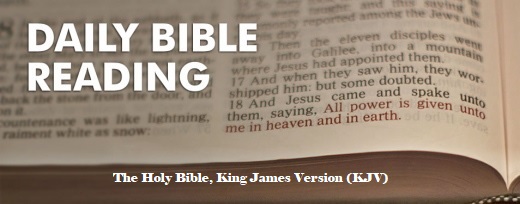The Daily Readings
THURSDAY, September 10, 2020
Psalm 114; Exodus 13:17-22; 1 John 3:11-16
The Holy Bible, King James Version (KJV)
Today's Verse-of-the-Day: Isaiah 46:4
And even to your old age I am he; and even to hoar hairs will I carry you: I have made, and I will bear; even I will carry, and will deliver you.
Today's Readings:
Tremble O earth
1 When Israel went out of Egypt, the house of Jacob from a people of strange language;
2 Judah was his sanctuary, and Israel his dominion.
3 The sea saw it, and fled: Jordan was driven back.
4 The mountains skipped like rams, and the little hills like lambs.
5 What ailed thee, O thou sea, that thou fleddest? thou Jordan, that thou wast driven back?
6 Ye mountains, that ye skipped like rams; and ye little hills, like lambs?
7 Tremble, thou earth, at the presence of the Lord, at the presence of the God of Jacob;
8 Which turned the rock into a standing water, the flint into a fountain of waters.
Pillar of cloud pillar of fire
13:17 And it came to pass, when Pharaoh had let the people go, that God led them not through the way of the land of the Philistines, although that was near; for God said, Lest peradventure the people repent when they see war, and they return to Egypt:
18 But God led the people about, through the way of the wilderness of the Red sea: and the children of Israel went up harnessed out of the land of Egypt.
19 And Moses took the bones of Joseph with him: for he had straitly sworn the children of Israel, saying, God will surely visit you; and ye shall carry up my bones away hence with you.
20 And they took their journey from Succoth, and encamped in Etham, in the edge of the wilderness.
21 And the Lord went before them by day in a pillar of a cloud, to lead them the way; and by night in a pillar of fire, to give them light; to go by day and night:
22 He took not away the pillar of the cloud by day, nor the pillar of fire by night, from before the people.
Love one another
3:11 For this is the message that ye heard from the beginning, that we should love one another.
12 Not as Cain, who was of that wicked one, and slew his brother. And wherefore slew he him? Because his own works were evil, and his brother's righteous.
13 Marvel not, my brethren, if the world hate you.
14 We know that we have passed from death unto life, because we love the brethren. He that loveth not his brother abideth in death.
15 Whosoever hateth his brother is a murderer: and ye know that no murderer hath eternal life abiding in him.
16 Hereby perceive we the love of God, because he laid down his life for us: and we ought to lay down our lives for the brethren.
Optional parts of the readings are set off in [square brackets.]
The Bible texts of the Old Testament, Epistle, and Gospel lessons are from The Holy Bible, King James Version (KJV).
The Daily Bible Readings are selected from the Revised Common Lectionary Daily Readings, a three-year cyclical lectionary. We are currently in Year A. Beginning with the first Sunday of Advent in 2020, we will be in Year B. The year which ended at Advent 2019 was Year C. These readings complement the Sunday and festival readings: Thursday through Saturday readings help prepare the reader for the Sunday ahead; Monday through Wednesday readings help the reader reflect and digest what they heard in worship. Revised Common Lectionary Daily Readings, copyright © 2005 Consultation on Common Texts. www.commontexts.org
The Daily Readings for THURSDAY, September 10, 2020
Psalm 114; Exodus 13:17-22; 1 John 3:11-16 (KJV)










